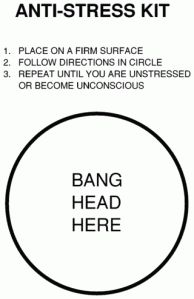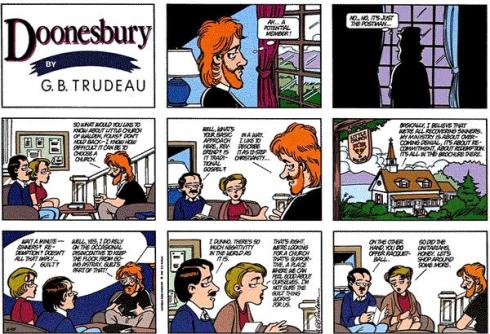I am having trouble staying silent on the current loud and rowdy health reform argument (I haven’t really seen much debate), then again, I haven’t been silent. Here is a repost of my position, first published in February 2008, layed out as clearly as I can make it.
———————————————————————————————–
For over 20 years our country and its undying commitment to capitalism have tried desperately to slow mushrooming healthcare costs, and failed miserably. HMOs, Capitation, things that business was confident would succeed where those fiscally incompetent doctors failed, fell flat. Patients, it seems, did not tolerate their health and well-being treated as a business.  I suppose business was part of the problem. After during WWII, with wages fixes and worker shortage, jobs starting sweetening benefits with healthcare and insurance to compete. It turns out patients and workers really, really like this system. It removes us from feeling any of the pain in our wallets with doctor visits and poor health.
I suppose business was part of the problem. After during WWII, with wages fixes and worker shortage, jobs starting sweetening benefits with healthcare and insurance to compete. It turns out patients and workers really, really like this system. It removes us from feeling any of the pain in our wallets with doctor visits and poor health.
Speaking in strictly capitalist, business terms customers were going to receive services from physicians, while a third party, insurance companies and businesses footed the bill. This removes some of the natural checks on inflation of cost. The patient and the doctor can now gang up on the third party payer, making control of spending difficult. So as an economist, obviously we just need to restore the marketplace, right?
It really depends on how one envisions healthcare. I can’t see going to the doctor or hospital the same as shopping for a new SUV, or getting cable TV. Our health is a fundamentally different thing, central to our quality of life, our independence, even the pursuit of happiness. Is it something people deserve or something we buy, dependent on our resources and wealth?
Without question it is dependent on our wealth to some extent, because it is creating a very real drag on our economy. Businesses have been weighed down with the cost of healthcare to the point where even the most heartless capitalist is demanding that the government do something to fix this mess. We spend more on healthcare by far than any other nation in the world. In spite of this, we have huge inequities in care with a mushrooming population of “working poor.”
These are people who have jobs and contribute to society, eliminating their eligibility for medicaid, but don’t have access or resources to get health insurance, so they go without. These people do take themselves out of the equation. The price checks work, as they stop seeing the doctor, that is until their uncared for hypertension, diabetes, cancer, lands them straight in the hospital desperately ill, devouring resources. But hey, a recent study actually showed this saves us money. We should just let them shorten their lifespan right?
You could even go so far as to say they deserve it for not taking care of themselves. If they just ate right they wouldn’t get hypertension or diabetes, right? Problem is fat, sugar, processed food are very cheap. Fresh fruit, vegetables, unprocessed grains are not so cheap and take time to prepare, time that could be spent working away at your minimum wage job to make ends meet. No, I am afraid blaming the poor has become an American pastime, one I am deeply ashamed of.
I have witnessed it firsthand. In medical school, our catholic hospital often received “patient dumps” from another large private hospital. These were medicaid patients, the cost of their care being eaten by the hospital. Medicaid pays substantially less than the actual cost of healthcare with the thought being that Hospitals and Doctors can take the hit as doing their share of charity work. This being the real world, the cost is passed on to everyone else through inflated costs to cover losses caring for the poor. These losses would be very manageable if the poor were evenly distributed among us, and everyone took in their share. Alas, the poor are concentrated in the inner cities, the victims of family flight to the suburbs, or in rural areas where the resources are scarce. We now have laws outlawing patient dumping and ERs everywhere are becoming the primary health care clinic for the poor. ER physicians are frustrated, burnt out and cynical. Many of them blog about it. Many of them grow contemptuous of those they care for. It is sad really.
The president recently stated that we actually have universal health care in this country. He was referring to our “safety net”, government and community hospitals. In fact all hospitals are now required by law to take care of everyone who walks through their doors, regardless of ability to pay.
I have spent a good portion of my training in county and inner city hospitals and I have seen our safety net in action. I have watched as a hospital has closed, causing an overflow of the poor to other hospitals. When the poor arrive in too large of numbers, the old patients get spooked. They equate care for the poor with substandard care. They leave and take their insurance with them. The end result is that, indeed, care for the poor becomes substandard. Morale in these hospitals is exceedingly low. They go bankrupt, they cut staff and wages to make ends meet, they outsource, then they die. All the while, patients with money cause the suburban hospitals to thrive, explode, and expand. This is what it means to make healthcare a commodity. This will destroy our “safety net.” This is a crisis.
A main argument I have seen on other blogs against a single payer system is that people will expect more, waste more and everything will cost more. They state that patients won’t tolerate the rationing of healthcare that a single payer system will require. Governments won’t control the spending because it is politically harmful. I agree. I can tell you right now, patients don’t tolerate rationing. We have a tiered system with quality going to the highest bidder. This is capitalism, welcome to America, right?
I just can’t embrace it. My stomach has turned watching the market in action as hospitals are destroyed and the face of the poor ground upon. The resources available to medicine are not unlimited. We do have to face this. Personally I believe a single payer system would at least be a huge improvement over the fractured system we have now. You could tax business what they are paying for healthcare right now, eliminate all the duplication of beauracracy in insurance companies and with the money you save, put it toward real quality that benefits everyone, all without raising costs, which you could fix with inflation adjustments to force economic responsibility. Since we spend twice as much on healthcare as any other nation, we would have the best system in the world instead of the most wasteful.
Realistically you would still have two tiers. The Uber rich, I am sure, would feel they wanted something better and would pay out of pocket to doctors that would only be too happy to oblige. If they pay taxes and foot the entire bill, I suppose it is only fair. They would be a definite minority. The important thing is that healthcare would become a resource that we share.
There is a certain basic concept that we are beginning to forget in our society, the concept of common wealth. Way back in the days of print media, communities would pool their resources to build a collection of books we call a library. This was because information and education was felt to be mutually beneficial if shared. The poor can only benefit from learning. We all can gain more as a group, enriching the whole, than any of us can individually. This is a way the group can protect resources from individuals who would devour or horde them. It turns out that together we have much more than any of us could ever hope to acquire individually. This is the thinking behind public museums, national parks. These are something different than commodities. They are actual sources of well being. This is our true wealth, and it is shared.
The common wealth of America are habitats, ecosystems, languages, cultures, science, technology, schools, social and political systems, democracy. These are things often so basic we sometimes forget how much we have. They are things we all value together and are well worth fighting for. So is medicine a right, or a commodity dependant on resources and wealth? My answer has to be an unqualified yes, it’s both.
I believe, sincerely in the depths of my soul, our commonwealth has to include medicine. We need to protect it, not exploit it. I doubt any of us could calculate what exactly any of these things would cost on the open market. I think it is safe to say that taken together our common wealth’s value exceeds all we could ever own privately.
This is why collectively, we need to move to protect healthcare and medicine and distribute it among ourselves equally. Yes this means placing some trust in the government, which after all represents all of us. I am just enough of a hopeless optimist to suggest this is something we must fight for. In the end, I have to come down believing health care is a right, inextricably tied with life, liberty, and the pursuit of happiness. I leave you with this closing thought about what I believe society should and can be.
“We need to speak up, to say boldly why we fight for good schools, why we build houses for the homeless, why we protect open space, why we look after the ailing and the elderly, why we pay taxes without grumbling, why we honor government as a force for public good. In a society obsessed with competition, we need to say why we practice cooperation. In a culture addicted to instant gratification, we need to champion long-term healing and the welfare of coming generations.”
–Scott Russell Sanders



 I suppose business was part of the problem. After during WWII, with wages fixes and worker shortage, jobs starting sweetening benefits with healthcare and insurance to compete. It turns out patients and workers really, really like this system. It removes us from feeling any of the pain in our wallets with doctor visits and poor health.
I suppose business was part of the problem. After during WWII, with wages fixes and worker shortage, jobs starting sweetening benefits with healthcare and insurance to compete. It turns out patients and workers really, really like this system. It removes us from feeling any of the pain in our wallets with doctor visits and poor health.









Recent Comments